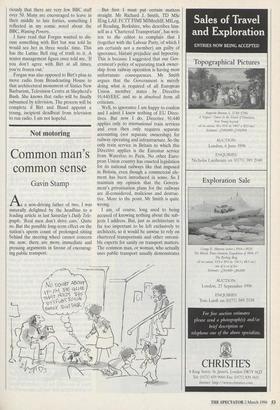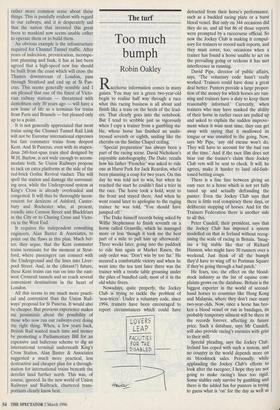Not motoring
Common man's common sense
Gavin Stamp
Aa non-driving father of two, I was naturally delighted by the headline to a leading article in last Saturday's Daily Tele- graph: 'Real men don't drive cars.' Quite so. But the possible long-term effect on the nation's sperm count of prolonged sitting behind the steering wheel cannot concern me now; there are more immediate and pressing arguments in favour of encourag- ing public transport. But first I must put certain matters straight. Mr Richard J. Smith, TD MSc IEng LAE FCTT FIMI MIMechIE MILog, of Reading, Berkshire, who describes him- self as a 'Chartered Transportant', has writ- ten to the editor to complain that I (together with the Labour Party, of which I am certainly not a member) am guilty of ignorance, blatant prejudice and hypocrisy. This is because I suggested that our Gov- ernment's policy of separating track owner- ship from railway operation is having most unfortunate consequences. Mr Smith argues that the Government is merely doing what is required of all European Union member states by Directive 91/440/EEC and so is absolved from all criticism.
Well, to ignorance I am happy to confess and I admit I knew nothing of EU Direc- tives. But now I do. Directive 91/440 applies only to international train services and even then only requires separate accounting (not separate ownership) for railway operating and infrastructure. So the only train service in Britain to which this Directive applies is the Eurostar service from Waterloo to Paris. No other Euro- pean Union country has enacted legislation for its national railways like that imposed in Britain, even though a commercial ele- ment has been introduced in some. So I maintain my opinion that the Govern- ment's privatisation plans for the railways are ill-considered, malicious and destruc- tive. More to the point, Mr Smith is quite wrong.
I am, of course, long used to being accused of knowing nothing about the sub- jects I address. But, just as architecture is far too important to be left exclusively to architects, so it would be unwise to rely on chartered transportants and other ostensi- ble experts for sanity on transport matters. The common man, or woman, who actually uses public transport usually demonstrates rather more common sense about these things. This is painfully evident with regard to our railways, and it is desperately sad that the nation that invented this great boon to mankind now seems unable either to operate them or to build them.
An obvious example is the infrastructure required for Channel Tunnel traffic. After years of indecision, prevarication, incompe- tent planning and funk, it has at last been agreed that a high-speed new line should be built from the coast which will cross the Thames downstream of London, pass through Stratford and end up at St Pan- cras. This seems generally sensible and I am pleased that one of the finest of Victo- rian railway stations — threatened with demolition only 30 years ago — will have a new lease of life as a terminus for trains from Paris and Brussels — but pleased only up to a point.
It is not generally appreciated that most trains using the Channel Tunnel Rail Link will not be Eurostar international expresses but fast commuter trains from deepest Kent. And St Pancras, even with its stupen- dous 240-foot-span train shed designed by W.H. Barlow, is not wide enough to accom- modate both. So Union Railways propose to tack on extra platforms at the side of the red-brick Gothic Revival viaduct. This will spoil the station and damage the surround- ing area, while the Underground system at King's Cross is already overloaded and congested. It will thus be thoroughly incon- venient for denizens of Ashford, Canter- bury and Rochester who, at present, trundle into Cannon Street and Blackfriars in the City or to Charing Cross and Victo- ria in the West End.
It requires the independent consulting engineers, Alan Baxter & Associates, to point out the flaws in this plan. Much bet- ter, they argue, that the Kent commuter trains terminate for the moment at Strat- ford, where passengers can connect with the Underground and the lines into Liver- pool Street. And, in the (distant?) future, these Kent trains can run on into the east- west Crossrail tunnels and so reach several convenient destinations in the heart of London.
All this seems to me much more practi- cal and convenient than the Union Rail- ways' proposal for St Pancras. It would also be cheaper. But previous experience makes me pessimistic about the possibility of those who now run our railways ever doing the right thing. When, a few years back, British Rail wasted much time and money by promoting a Parliamentary Bill for an expensive and ludicrous scheme to dig an international terminal underneath King's Cross Station, Alan Baxter & Associates suggested a much more practical, less destructive and cheaper plan for a through- station for international trains beneath the derelict land further north. This was, of course, ignored. In the new world of Union Railways and Railtrack, chartered trans- portants clearly know best.



































































 Previous page
Previous page